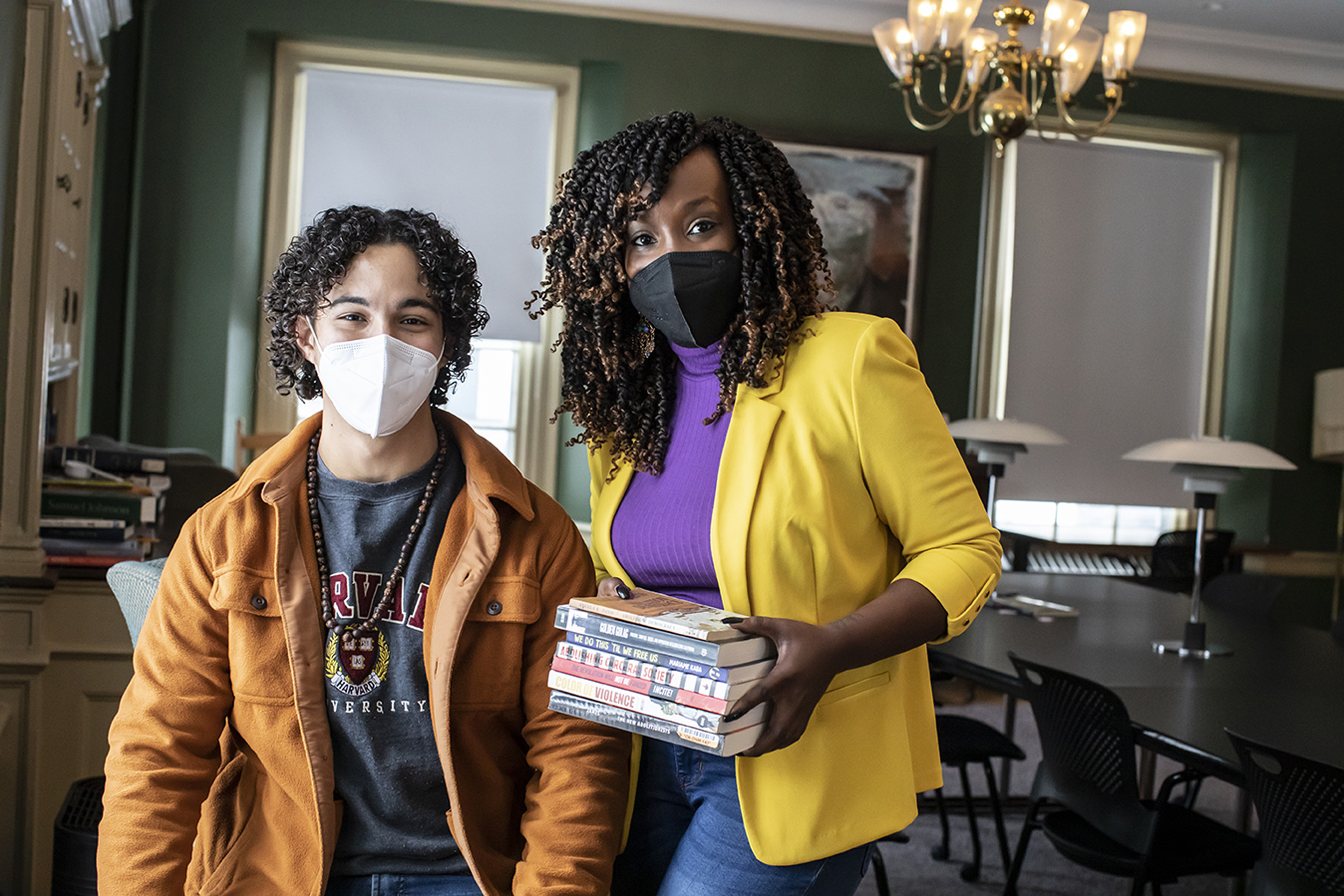
DeAnza Cook (right) with student member Luke Walker at Cabot House Library, where the Cabot Prison Abolition Book Club meets.
Rose Lincoln/Harvard Staff Photographer
Examining prison abolition — one volume at time
Cabot House book club wrestles with causes, solutions to complex issue through discussions, ‘Reading Jam Sessions’
Prison abolition is a complex and thorny issue, so the members of the Cabot Prison Abolition Book Club, led by history graduate student DeAnza Cook, take it on one volume at a time.
“Understanding abolition is a journey,” said Cook, a doctoral candidate and Cabot House tutor who founded the club. “Journeying together takes patience. It takes curiosity. But it also takes a passion for wanting to rethink certain things that we’ve been so habituated to think are true and to challenge ourselves to reckon with how we’re all implicated in systemic violences that prevail.”
The prison abolition movement calls for not just structural reforms of the prison industrial complex, but dismantling of the entire system and replacing it with programs to deal with root causes of crime such as poverty, addiction, homelessness, and mental illness. Understanding the problem calls for deep dives into the history, sociology, and economics of race and class in America. Cook said students craved to learn more but were not finding that information in their curriculum. She was approached by a student in Cabot about creating the club to better understand the movement and where it stands in the U.S. Thus, the club was born in the fall of 2020 as part of virtual House programming during the pandemic.
“We have a budding community of faculty members who are beginning to teach these courses focused explicitly on abolition history, theory, and practice,” said Cook, whose research is focused on police science, reform, and administration in the nation. “But what’s beautiful about the living and learning communities here at Harvard is that we have at least some funds in some capacity to nurture the interests that are budding among our students, right there where they live.”
Senior Luke Walker, who lives in Cabot, is one of the 18 members of the club. (Cook says meetings are open to students across campus and not limited to just House members who have signed up.) Walker, a statistics concentrator in the dual-degree program with Berklee College of Music, said his interest stems from his participation in Berklee’s Global Jazz Institute. There, he said, members are encouraged to be social activists and are taught that musicians must use their power to change minds, influence people, and build empathy.
With that mindset, Walker has dedicated himself to learning about different social issues. The book club allowed him to delve into prison abolition, a subject he admitted to not knowing much about but that affects millions of people in the U.S.
“I think it’s great to have various means of discovery and learning outside of the typical confines of the courses that we have to take,” the 21-year-old said. “A book club provides a low-pressure and safe environment to read these sorts of things and discuss them freely.”
Suggested readings
- “Golden Gulag: Prisons, Surplus, Crisis, and Opposition in Globalizing California” by Ruth Wilson Gilmore
- “Abolition Democracy: Beyond Empire, Prisons, and Torture” by Angela Davis
- “We’ll Do This ‘Til We Free Us” by Mariame Kaba
- “Reform or Abolition?” by Julia Sudbury
- “Abolishing Carceral Society” by Abolition Society
- “The Revolution Will Not Be Funded: Beyond the Non-Profit Industrial Complex” by INCITE! Women of Color Against Violence
- “Color of Violence” by INCITE! Women of Color Against Violence
- “The New Abolitionists: Neo(slave) Narratives And Contemporary Prison Writings” by Joy James

Book club members meet twice a month, once to discuss the reading and again to read and listen to music in what Cook called “Reading Jam Sessions,” on a rotating basis. Participants in the gathering, which fluctuates in size each month, grab snacks during their in-person meet-ups and have a celebration lunch with foods from local restaurants at the end of each semester.
“The goal of the book club space is to invite people in and to build a learning community where people can explore not just what abolition is, but the history of abolition, and how abolition applies in our everyday lives,” Cook explained. She said book club members jointly pick what to read, meet to discuss the ideas that struck them most, and listen to lectures, videos, and podcasts about abolition.
Students have read several books and articles since the club started, including an article by Julia Sudbury called “Reform or abolition?” and Angela Davis’ “Abolition Democracy.” This semester, the reading list includes “We Do This ’Til We Free Us” by organizer, educator, and curator Mariame Kaba.
Walker said “Abolition Democracy,” which students read last semester, opened his eyes to the interconnectivity of several issues.
“I didn’t realize that the prison industrial complex had so many connections with slavery and with the military industrial complex,” he said. “She talks so well about the connection between those things, and it helped me get a bigger picture that all of these issues are so complex.”
He and Cook emphasized that book club members are not experts in the subject of abolition, but rather continual learners.
“That’s kind of why we’re here at Harvard. To be exposed to new ideas and experiences that may be different from ours,” Walker said. “And it’s really important as a growing intellectual and as a future citizen of the world.”







